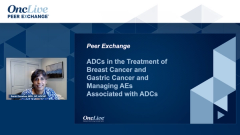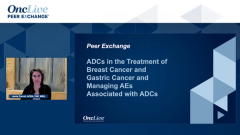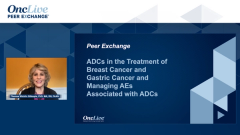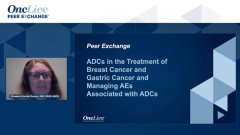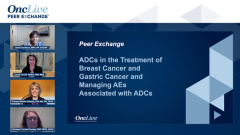
Practice Pearls for Toxicity Management With ADC Therapy in Breast and Gastric Cancer
Shared practical advice on the management of toxicities associated with antibody drug conjugate therapy in both the breast cancer and GI cancer settings.
Episodes in this series

Transcript:
Sarah Donahue, MPH, NP, AOCNP: Before we close, I would like to ask each one of you to share some pearls for your fellow nurses regarding toxicity management and antibody-drug conjugates [ADCs] in patients with metastatic breast cancer and gastric cancer. Jamie, why don’t you go first?
Jamie Carroll, APRN, CNP, MSN: Sure. For breast cancer, if there’s any risk of stomatitis, or peripheral neuropathy, just think “freeze.” Freeze everything. Have them [patients] chew ice in the chemotherapy unit, have them stick their hands and their feet in Elasto-Gel mittens and booties. If you’re worried about alopecia, try cryotherapy to the head. Just think ice is never wrong.
Additionally, I do see where patients have dryness of the mouth and mucosal membranes. So I recommend XyliMelt, it’s a little disc they can put down under their cheek at night, and it helps stimulate the salivary gland. Or they can buy a $2 bag of Jolly Ranchers, and if they suck on those, that helps stimulate the salivary glands to help with their dry mouth.
Sarah Donahue, MPH, NP, AOCNP: Thanks. Liz, why don’t you go next?
Elizabeth Prechtel Dunphy, DNP, CRNP, AOCN: What I would suggest is doing a very good initial assessment, whether you’re meeting the patient for the first time or you’re seeing them in follow-up. But I think in particular, before they start treatment, know where they are at baseline. My case study was about diarrhea, and so having that information prior to seeing the patient as they start treatment gives me good information. Secondly, I always like to, if I can, involve the caregiver because they are always the tattletale in the room. The patients don’t always like that, but I think it’s good to have someone who is in real time with the patient from day to day, being able to give their perspective. Obviously, they can’t tell you what the patient is feeling, but they can at least tell you what they are observing, which gives some added input to help you make decisions for the patient.
Sarah Donahue, MPH, NP, AOCNP: Excellent. And Theresa?
Theresa Wicklin Gillespie, PhD, MA, RN, FAAN: I have 2 points that I’d like to share or reinforce. The first is tagging a little from what Liz said about a baseline assessment. For me, it would be to do a thorough and careful assessment in terms of what might be a toxicity or some kind of sign or symptom the patient is experiencing, and trying to figure out for real, is this the drug? Is this the cancer? Is this the therapy? Because that’s all too often, perhaps, easy to mix up, and therefore that would influence the best intervention.
But the second point is just to remember that regardless of whatever the drug is, these patients have metastatic disease. And part and parcel with that is high anxiety. So, every single twinge or any symptom that they’re experiencing, to them, has to represent that this is progression of the disease, this is another site of metastasis. It influences and colors all of our interactions. And so, do whatever you as the provider can do to help both the patient and the caregiver or family member to recognize that, yes, this is metastatic disease, but something I said earlier about looking at it more as a marathon than a sprint. Because if you do look at those second- and third- and fifth-line options, in many cases there is lots and lots on the menu. That’s not a panacea, it’s just something that hopefully can be helpful.
Sarah Donahue, MPH, NP, AOCNP: Thanks, Theresa. For me, for a pearl to share, when I have patients who are going on a regimen that’s highly immunogenic, I of course want to prevent adverse effects as much as possible. For trastuzumab deruxtecan, we’ve had a lot of issues with nausea. So I make sure that they [my patients] have a lot of premedications, and I give them everything I listed earlier, with the aprepitant, and the 5-HT3 [5-hydroxytryptamine 3 receptor] inhibitor, and the dexamethasone, and whatever else I can add in there. But also I have been prescribing patients often olanzapine. It was shown to be effective for patients getting doxorubicin and cyclophosphamide, the early stage regimens we use for breast cancer, and it was shown to reduce and prevent nausea if they took it just for the first 5 nights. I’ve used that with trastuzumab deruxtecan quite a bit. So, I would recommend that to anybody.
Also, I do totally agree, Theresa, that everything is in the details with patients. Understanding what they’re experiencing every day and every moment of that day, and what they’re taking to deal with it, and how they manage, that helps you figure out what the cause is and how to treat it. Asking a lot of questions; I always think I drive my patients crazy but asking more questions is always better.
Thank you everyone for joining us. And to our viewing audience, thank you for joining us as well. We hope you found this OncLive® Peer Exchange discussion to be useful and valuable in treating your patients with HER2-positive breast cancer and gastric cancer. Thank you all.
Transcript edited for clarity.
Newsletter
Knowledge is power. Don’t miss the most recent breakthroughs in cancer care.

